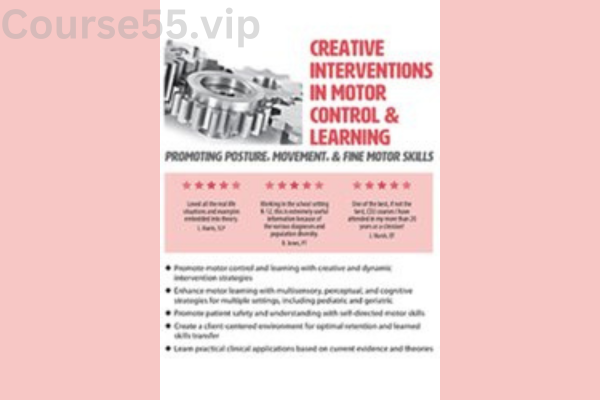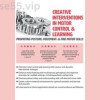Creative Interventions in Motor Control & Learning: Promoting Posture, Movement, & Fine Motor Skills By Barbara Natell – PESI
$199.00 Original price was: $199.00.$23.10Current price is: $23.10.
Creative interventions in motor control & learning: Promoting posture, movement, & fine motor skills by Barbara Natell – Digital Download!

Creative Interventions in Motor Control & Learning: Promoting Posture, Movement, & Fine Motor Skills By Barbara Natell – PESI
Overview

Exploring Innovative Approaches in Motor Control and Learning by Barbara Natell
In the modern world, where speed and precision are essential, mastering motor control and learning is more important than ever, particularly in rehabilitation and occupational therapy. The course Creative Interventions in Motor Control & Learning: Promoting Posture, Movement, & Fine Motor Skills, guided by Barbara Natell, presents an in-depth exploration of strategies designed to improve patient outcomes. Through over six hours of engaging audio and video content, this course offers professionals a comprehensive understanding of motor learning, making it a key resource for those working to enhance motor skills in patients.
Barbara Natell, an experienced occupational therapist, is at the helm of this course, providing a well-rounded approach to motor control. The curriculum revolves around three pivotal elements that influence motor learning: environmental factors, cognitive processes, and the organization of multisensory movement. This holistic perspective not only enriches understanding but also emphasizes the significance of tailoring interventions to each patient, ultimately advancing functional mobility. This methodical approach is vital for therapists aiming to integrate effective strategies into their practice.
Understanding the Principles of Motor Learning
The importance of grasping motor learning transcends theoretical knowledge and has direct implications for clinical practice. The course introduces participants to several theoretical frameworks that shape motor control, such as reflex integration, hierarchical theory, and ecological theory. By analyzing these frameworks, clinicians are better prepared to handle the complexities involved in motor rehabilitation and habilitation.
The ecological theory, for instance, underscores the interaction between individuals and their surroundings, emphasizing that optimal motor performance arises from a balanced relationship between the two. This understanding helps clinicians design interventions that are more suited to real-world functional contexts.
Furthermore, the course makes a clear distinction between motor skill performance and motor learning, allowing participants to understand the differences between acquiring new skills and refining existing ones. This knowledge enables clinicians to use strategies that ensure patients retain and apply their skills effectively in daily activities. The course also includes practical labs where clinicians practice physical handling techniques and develop body awareness, which is key to improving motor learning outcomes.
Experiential Learning for Practical Application
A distinctive feature of the course is its hands-on learning opportunities, offering a chance for clinicians to apply their knowledge in realistic, simulated scenarios. These practical labs allow participants to experiment with different intervention strategies, reinforcing theoretical concepts about motor control.
Through the development of body awareness, clinicians can better assess patient needs and improve their ability to address those needs effectively. This hands-on approach enhances retention and helps build confidence as therapists implement techniques in their clinical practice.
In addition to the practical labs, the course guides participants in crafting evidence-based treatment plans. Clinicians learn to identify key factors that influence therapeutic outcomes and develop strategies that optimize motor learning environments. By understanding individual patient needs and contextual factors, therapists can create personalized interventions to improve postural stability and mobility.
Building Evidence-Based Interventions for Motor Learning
Evidence-based practices are becoming the benchmark in healthcare, and this course equips participants with the knowledge to integrate the latest research into their therapeutic approaches. By exploring current evidence linking motor control and learning, clinicians gain valuable insights into the factors that drive successful outcomes.
For example, research suggests that interventions that incorporate environmental cues tend to lead to better motor performance. Understanding this dynamic allows therapists to design more effective, individualized interventions, building on the foundational theories presented in the course.
The course also encourages critical evaluation of various motor control theories, allowing clinicians to assess their strengths and limitations and apply the most effective strategies in their practice. This analysis is especially helpful in cases where motor learning is impeded, as it helps therapists identify barriers and develop creative solutions to overcome them.
Learning Outcomes: Enhancing Clinical Practice
By completing the course, participants will gain the knowledge and skills necessary to elevate their therapeutic practices. Key takeaways include:
-
Differentiating between motor skill performance and motor learning to optimize treatment planning.
-
Assessing the strengths and limitations of motor control theories for practical use in therapy.
-
Analyzing current research linking motor control and learning to identify crucial factors for therapeutic success.
-
Evaluating individual, task, and contextual conditions that can hinder motor learning and postural stability.
-
Developing environments and communication strategies that foster optimal motor learning in diverse functional settings.
These outcomes not only demonstrate the course’s practical relevance but also assure clinicians that the time invested will have a direct impact on their therapeutic practice.
Expert Instruction and Flexible Learning Opportunities
What truly sets Barbara Natell’s course apart is its format and delivery. With over 6 hours of on-demand audio and video content, learners can engage with the material at their own pace. This flexibility is particularly valuable for busy professionals who must balance continuous education with their clinical duties.
Barbara Natell’s expertise shines throughout the course, offering a range of learning approaches that cater to different styles. The combination of theory and practice, along with the ability to learn at a comfortable pace, makes this course an excellent choice for clinicians seeking to refine their motor control and learning skills.
The course is widely recognized for its practical approach and high-level instruction, making it a beneficial addition to any clinician’s education. Upon completion, participants will feel confident that they can significantly enhance the care they provide to their patients.
Conclusion: A Comprehensive Learning Experience
In conclusion, the Creative Interventions in Motor Control & Learning: Promoting Posture, Movement, & Fine Motor Skills course offers a well-rounded educational experience, blending theoretical knowledge with practical application. Under the expert guidance of Barbara Natell, clinicians will deepen their understanding of motor learning and control while gaining practical strategies to improve patient outcomes.
Whether exploring theoretical frameworks or participating in hands-on activities, this course is an essential resource for occupational therapists and related professionals aiming to enhance their practice. With evidence-based insights and flexible learning options, the course is a compelling investment for clinicians looking to improve their understanding of motor skills and implement effective, evidence-backed interventions.
Frequently Asked Questions:
Business Model Innovation: We operate a group buying strategy, allowing participants to share costs and access popular courses at reduced prices. This model benefits individuals with limited financial resources, despite concerns from content creators about distribution methods.
Legal Considerations: The legality of our operations involves complex issues. Although we don’t have explicit permission from course creators to resell their content, there are no specific resale restrictions stated at the time of purchase. This ambiguity creates an opportunity for us to provide affordable educational resources.
Quality Control: We ensure that all course materials purchased are identical to those offered directly by the creators. However, it’s important to understand that we are not official providers. As such, our offerings do not include:
– Live coaching calls or sessions with the course author.
– Access to exclusive author-controlled groups or portals.
– Membership in private forums.
– Direct email support from the author or their team.
We aim to reduce the cost barrier in education by offering these courses independently, without the premium services available through official channels. We appreciate your understanding of our unique approach.
Be the first to review “Creative Interventions in Motor Control & Learning: Promoting Posture, Movement, & Fine Motor Skills By Barbara Natell – PESI” Cancel reply
You must be logged in to post a review.

















Reviews
There are no reviews yet.